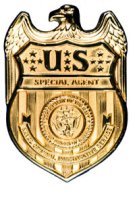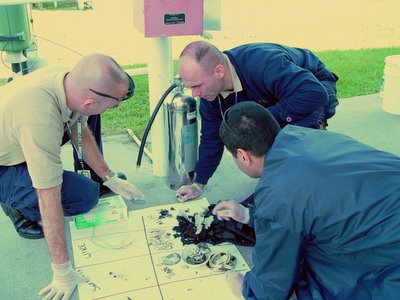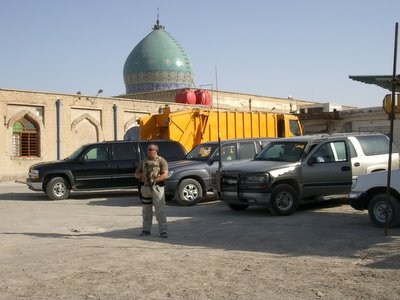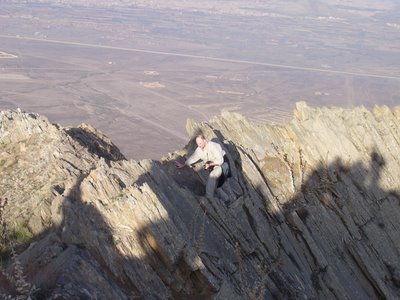 Criminal investigations…foreign counterintelligence…polygraph exams…dignitary protection…these are just a few of the jobs performed by Marine Corps special agents of the Naval Criminal Investigative Service (NCIS).
Criminal investigations…foreign counterintelligence…polygraph exams…dignitary protection…these are just a few of the jobs performed by Marine Corps special agents of the Naval Criminal Investigative Service (NCIS).The NCIS is a unique federal law enforcement agency comprised of special agents, investigators, forensic experts, security specialists, analysts, and support personnel. Headquartered at the Navy Yard in Washington, D.C., it is the primary law enforcement and counterintelligence arm of the United States Department of the Navy. The NCIS maintains a worldwide presence – its special agents operate from 15 field offices, including one operational unit dedicated to counterespionage, and more than 140 individual locations around the globe.
As the investigative arm of the Department of the Navy and the Marine Corps, NCIS special agents deploy to locations most federal agencies fear to tread. You’ll find NCIS special agents serving aboard aircraft carriers or aboard the ships of an Expeditionary Strike Group (ESG). They currently serve among the Marines and sailors of the I Marine Expeditionary Force (MEF) in Iraq, as well as in Afghanistan and among the Marine expeditionary units (MEU) in the Atlantic and Pacific and Persian Gulf. Forward deployed to dozens of countries around the globe, NCIS special agents strive to prevent terrorism, to protect the secrets of the Navy and the Marine Corps, and to reduce crime through a proactive and highly regarded criminal investigative program.
 Unknown to many Marines and civilians alike, a small cadre of Marines work alongside the civilian special agents. They carry the same badge, conduct the same investigations, and testify at the same court hearings. They are Marine special agents, a few men and women of NCIS who’ve been individually screened and selected to serve the Navy and Marine Corps in a unique and exciting capacity. Previously assigned to the Criminal Investigative Division (CID) office at a major Marine Corps installation, the Marine special agent, once selected, is assigned to an NCIS field office or resident agency, such as the
Unknown to many Marines and civilians alike, a small cadre of Marines work alongside the civilian special agents. They carry the same badge, conduct the same investigations, and testify at the same court hearings. They are Marine special agents, a few men and women of NCIS who’ve been individually screened and selected to serve the Navy and Marine Corps in a unique and exciting capacity. Previously assigned to the Criminal Investigative Division (CID) office at a major Marine Corps installation, the Marine special agent, once selected, is assigned to an NCIS field office or resident agency, such as theCarolina Field Office located at and Camp Lejeune, N.C. or the Marine Marine Corps West Field
Office at Camp Pendleton, Calif.
Indistinguishable from a civilian special agent, the Marine special agents are treated as equals within the organization. Though technically employed by the Marine Corps, they no longer stand formation or uniform inspection. Instead, they stand duty, responding to crime scenes and engaging with commands who’ve fallen victim to a criminal act. They carry their own caseload of criminal or foreign counterintelligence investigations, working the cases from inception to prosecution. Often cooperating with other federal, state and local law enforcement agencies, the Marine special agents build a network of contacts and associates to further assist them in the conduct of their investigations.
According to Colonel John Forquer, the current military assistant to the NCIS Director and commanding officer of the NCIS Office of Military Support, roughly 65 Marine special agents and six counterintelligence Marines now fill the ranks of NCIS. They are joined by 130 Navy reservists and approximately 200 active-duty sailors performing various administrative, counterintelligence and analyst duties roles throughout the agency.
Despite the change in their working environment, the Marine special agents are still required to participate in PFTs, qualify with their firearms and meet the height and weight standards required of Marines in uniform. They still abide by professional military education requirements and are screened for promotion. Although they’ve traded their uniforms for a coat and tie, they remain Marines underneath and as such, are expected to meet the high standards of performance, physical readiness, and conduct.
With today’s demanding operational tempo, it is very likely that they will be deployed in support of potentially dangerous assignments and duties. Marine special agents were the some of the first NCIS special agents deployed to Iraq at the start of Operation Iraqi Freedom in 2003. From OIF I to present, over 32 former and current Marine special agents have deployed to Iraq to support the war on terrorism.
 Leatherneck NCIS agents have conducted investigations into criminal misconduct of Marines and sailors, ranging from common theft incidents to sexual assaults. They’ve spent countless hours investigating non-combat related deaths and allegations of detainee abuse. They’ve embedded with other NCIS special agents at locations such as Camp Fallujah, Camp Blue Diamond, Tikrit, Taqaddum and Al Asad. Five Marine special agents are currently assigned to the 2006 deployment cycle in support of OIF and Operation Enduring Freedom in Afghanistan: Master Sergeant Tim Fowler,
Leatherneck NCIS agents have conducted investigations into criminal misconduct of Marines and sailors, ranging from common theft incidents to sexual assaults. They’ve spent countless hours investigating non-combat related deaths and allegations of detainee abuse. They’ve embedded with other NCIS special agents at locations such as Camp Fallujah, Camp Blue Diamond, Tikrit, Taqaddum and Al Asad. Five Marine special agents are currently assigned to the 2006 deployment cycle in support of OIF and Operation Enduring Freedom in Afghanistan: Master Sergeant Tim Fowler,Gunnery Sgt William Link, GySgt. Mark McLawhorn, SSgt Michael Payne and Sergeant Jeffrey Farmer.
Marine special agents have also served on personal protection teams in the cities of Al Hillah and Al Basra, protecting high-level dignitaries of the Coalition Provisional Authority (CPA) and the United Nations from potential threats and harm. Since the start of OIF, Marine special agents have subsequently deployed to Afghanistan, Kuwait, Bahrain, Djibouti and numerous other locations in the war against terrorism. First to fight, the Marine special agents are always at the tip of the NCIS spear.
MSgt Tim Fowler, a Marine special agent from the Washington Field Office, is an NCIS subject matter expert in the field of computer forensics and computer crime investigations. Deployed by NCIS to Iraq during OIF I, MSgt Fowler utilized the skills he practiced as a NCIS special agent to assist various governmental agencies with the screening of computer materials seized across the area of operations. Traveling across Iraq in a variety of military and civilian vehicles, his actions and incredible successes on the battlefield earned him a Bronze Star with combat “V”. MSgt Fowler is currently deployed with NCIS to Afghanistan in support of OEF, continuing the fight against terrorism.
MSgt Tim Fowler, Marine Special Agent, atop Mount Ghar, Afghanistan
GySgt Dan Carlin, a Marine special agent at the Carolinas Field Office, volunteered to serve on a dignitary protection team in the city of Al Hillah, Iraq during OIF 3. Part of a nine-man team dedicated to providing personal protection for the CPA ambassador in south central Iraq, “Gunny” Carlin often found himself dual-hated as a gunner and team navigator, using the land navigation skills he learned as a Marine to navigate around the small towns and villages between Baghdad and Hillah.
MSgt Patty Lyons, a Marine special agent from the NCIS Resident Agency in Quantico, deployed to Iraq in support of the NCIS criminal investigative mission, spending the bulk of her time with the Third Marine Aircraft Wing at Al Asad. Her assignment took her on dozens of “milk runs” aboard CH-46 Sea Knight and CH-53 Super Stallion helicopters to Al Asad, Taqaddum, and Camp Fallujah during her deployment, investigating crimes including arson, assault, bribery and graft.
Special Agent Doug Einsel, the supervisor for the NCIS detachment at Camp Fallujah, Iraq during OIF 4-6, said NCIS special agents, both Marine and civilian, are dedicated to supporting the MEF in Iraq, providing criminal investigative support and force protection methodology to the MEF. Working closely with the MEF antiterrorism/force protection (ATFP) cells and force-protection units established at each of the camps, the NCIS agents seek to identify physical and counterintelligence vulnerabilities which could jeopardize the health and well-being of Marines located at or transiting to the camps.
Formerly military police investigators (MOS 5819) or criminal investigators (MOS 5821), the Marine special agents receive their entry-level law enforcement training via the Marine Corps MOS training program at the Army’s Fort Leonard Wood, Missouri. Following their acceptance into NCIS, they are required to attend six weeks of specialized training conducted at the Federal Law Enforcement Training Center (FLETC) in Glynco, Georgia. Operated by the U.S. Department of Homeland Security, FLETC provides law-enforcement training to 81 partner agencies, to include the U.S. Marshals Service, the U.S. Secret Service, the U.S. Border Patrol, and the Bureau of Alcohol, Tobacco and Firearms.
The newly selected Marine special agents learn the “ins and outs” of felony level investigations and how to operate in a civilian environment. They use this training time to sharpen their skills and to learn some advanced techniques for conducting crime scene examinations and interviews, enabling them manage a felony investigation from crime scene to courtroom.
For those special agents engaged in the war against terrorism, FLETC is creating a Counterterrorism Operations Training Facility to augment their already robust training center, situated on the grounds of the former Brunswick, Ga., Naval Air Station. The $50 million facility will recreate various settings, both foreign and domestic, that agents might encounter in the field, including urban and rural neighborhoods, subway stations, buildings and roadways. Within the facility, a mock Middle Eastern training village was constructed, providing students a realistic environment simulating the urban environment of Iraq. At least 13 organizations at FLETC, including NCIS, currently send graduates overseas in direct support of the war on terrorism.
Post academy training for both Marine and civilian special agents covers a variety of subjects, including but not limited to legal instruction, forensics, crime scene processing, firearms, driver training, computer crimes, illicit narcotics, child pornography, larceny, and a host of other activities prosecutable under the Uniform Code of Military Justice and the United States Code. If necessary, Marine special agents are granted relaxed grooming standards for certain activities, such as narcotics or gang investigations. Blending into their surroundings aboard base or out in town, the Marine special agents are an inseparable part of the NCIS team.
Seamlessly integrated into NCIS, the Marine special agents are enthusiastic about being part of the NCIS team. According to Col Forquer, the special agents in charge of the NCIS field offices are quick to tell you that the Marines assigned to the field offices are a critical part of their team. “They have an outstanding work ethic and eagerly take on the tough assignments. They are true professionals, absolutely dedicated to the mission. But if you asked a Marine special agent, he or she’d just tell you that it’s all in a days work.”
Leatherneck Editors Note: LtCol Covert served as one of two U.S. Marine Corps Field Historians deployed to Iraq during OIF 4-6. Traveling throughout the Al Anbar and Babil provinces, he collected 240 taped interviews of Marines, sailors and soldiers engaged in combat operations, security and stability operations (SASO) and combat service support. The interviews, along with corresponding photographs and documentary materials, are permanently archived at the Marine Corps Historical Division at Marine Corps Base Quantico, VA. In his civilian career, LtCol Covert is a Supervisory Special Agent for the Naval Criminal Investigative Service in Norfolk, VA.
